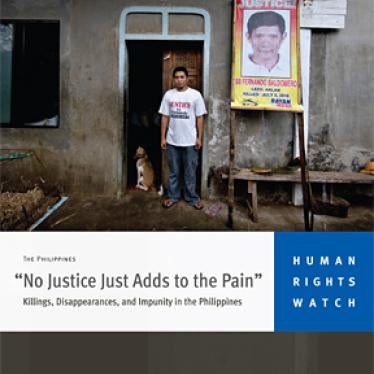(New York) – President Benigno Aquino III should sign into law a bill criminalizing enforced disappearances in the Philippines, Human Rights Watch said today. The Philippine Congress passed the bill, the Anti-Enforced or Involuntary Disappearance Act of 2012, on October 16, 2012, and sent it to the president for signature.
The law, if enacted, would be the first to criminalize enforced disappearances in Asia, Human Rights Watch said. It would demonstrate the Philippine government’s commitment to address human rights abuses such as the abduction and killing by the security forces of activists, environmentalists, and journalists.
“Enforced disappearances, often involving torture and extrajudicial killings, have been a blot on the Philippines’ human rights record since the Ferdinand Marcos dictatorship,” said Brad Adams, Asia director at Human Rights Watch. “To this day, activists are still being abducted by the authorities and ‘disappeared.’ This law would be an important step towards ending these abuses.”
The Anti-Enforced or Involuntary Disappearance Act of 2012 reflects recommendations long made by domestic human rights organizations. It defines an enforced or involuntary disappearance as “the arrest, detention, abduction or any other form of deprivation of liberty committed by agents of the State or by persons or groups of persons acting with the authorization, support or acquiescence of the State, followed by a refusal to acknowledge the deprivation of liberty or by concealment of the fate or whereabouts of the disappeared person, which places such person outside the protection of the law.” This definition is derived from international human rights standards.
The act penalizes violators with a life sentence or decades in prison. It also prohibits amnesty for violators and declares that the government cannot suspend the law even in times of war or public emergency. It states that the commanding or superior officer of the unit or personnel implicated in an enforced disappearance case is just as liable as the person who physically carries out the crime.
Crucially, the act also makes the “order of battle” – a document prepared by the military identifying alleged threats and enemies – illegal, stating that “it cannot be invoked as a justifying or exempting circumstance.” Under the act, any person who receives an “order of battle” from their superiors “shall have the right to disobey it.” Many victims of enforced disappearances and extrajudicial killings have been listed or said to have been listed in such “orders of battle.”
The Anti-Enforced or Involuntary Disappearance Act of 2012 also deems unlawful secret detention facilities and directs the government to make a full inventory of all detention facilities in the Philippines. It orders the government to create a registry of every detainee, complete with all relevant details including who visited the detainee and how long the visit lasted. The act also mandates and authorizes the governmental Commission on Human Rights “to conduct regular, independent, unannounced and unrestricted visits to or inspection of all places of detention and confinement.” It allocates 10 million pesos (approximately US$250,000) to the commission, which will be tasked with the initial implementation of the law. Human rights organizations are likewise encouraged to draft the implementing rules and regulations along with the Department of Justice.
Enforced disappearances were rampant during the dictatorship of President Ferdinand Marcos, when the military and police routinely rounded up activists and suspected communist supporters and rebels. The practice did not end with Marcos’s ouster in 1986. Many enforced disappearances occurred during the administration of President Gloria Macapagal-Arroyo. At least 11 activists have “disappeared” since Aquino took office in 2010, according to local rights groups, though there are no allegations that the Aquino administration has direct responsibility.
Human Rights Watch detailed some of these cases in its 2010 report, “No Justice Just Adds to the Pain,” and in a video released earlier this year in which family members of the disappeared call on the president to live up to his promises of justice.
Human Rights Watch urged Aquino to sign the International Convention for the Protection of All Persons from Enforced Disappearance and transmit it to the Senate for prompt ratification.
In Asia, only Japan has signed and ratified the Convention, placing Asia behind other regions of the world.
“Congress has done a great job in taking the initiative to pass a law on enforced disappearances,” Adams said. “President Aquino can show his administration’s commitment to ending this black chapter of Philippine history. He can also assume a role as a regional leader on human rights.”







